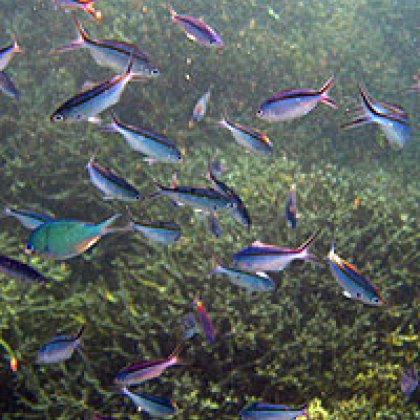
A UQ ecologist has received an international award for research that could lead to better conservation plans for the Pacific Ocean’s tropical reefs, including Australia’s Great Barrier Reef.
The United States Regional International Association for Landscape Ecology Meeting (US-IALE) recognised Dr Eric Treml's marine conservation paper as the Outstanding Paper in Landscape Ecology Award for 2008.
The paper, written with colleagues from Duke University, illustrates a novel and powerful methodology for quantifying marine connectivity, which refers to how distant marine populations are linked to each other through the exchange of individuals.
"Imagine a group of fish on a coral reef. If one larval fish makes it across to another group on another reef and becomes part of that group, that’s connectivity," Dr Treml said.
Dr Treml, from the School of Biological Sciences, said this connectivity was fundamental to understanding the population dynamics of species, marine biodiversity, and the conservation of marine systems.
In their paper, Dr Treml and his colleagues' spatial modelling approach used ocean current data and maps of coral reef habitat to simulate larval dispersal events throughout the entire tropical Pacific.
"Essentially we developed a model to show, for instance, where coral larvae from the Great Barrier Reef could end up and how all of the reefs in between are interconnected," he said.
"Could Australia's coral reef populations be connected with other reefs thousands of kilometres away, like the Cook Islands? And if so, what were the stepping stones, other reefs, they used to get there?" said Dr Treml.
Dr Treml said the team was now using genetic data to evaluate their model system.
"We can look at the genetics of a population and see whether there was connectivity with another nearby population and whether our model predicted that accurately. Preliminary data for some species shows it does," he said.
Dr Treml said the research will enable people to make decisions about which reefs in the tropical Pacific are essential for a species survival and can provide a model to map how species may cope with the effects of climate change.
The paper, titled Modelling population connectivity by ocean currents, a graph-theoretic approach for marine conservation, was selected from all of the papers published in the field of landscape ecology within the past two years.
US IALE said the article was selected because it applied a system typically used in landscape ecology and applied it to a marine system – a novel approach.
Dr Treml is a World Wildlife Fund Fuller Fellow and UQ research fellow in Dr Cynthia Riginos Lab and Professor Hugh Possingham’s Spatial Ecology Lab where he is building on these research questions and methods in the complex and critically threatened region of the Coral Triangle and Indo-Pacific.
Media: Dr Eric Treml (07 3365 1864, email:e.treml@uq.edu.au) or Travis Taylor, Faculty of Science (07 3365 8598, email: t.taylor1@uq.edu.au).
.jpg)



